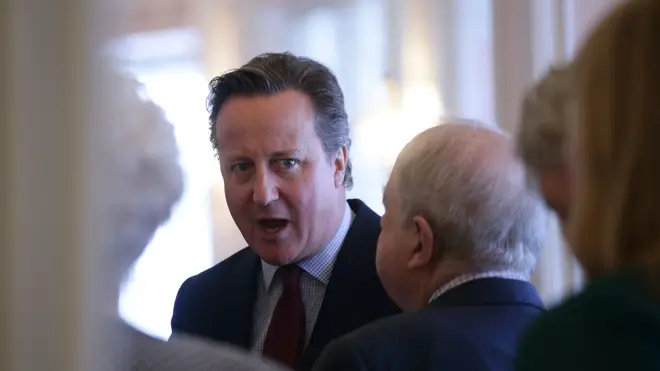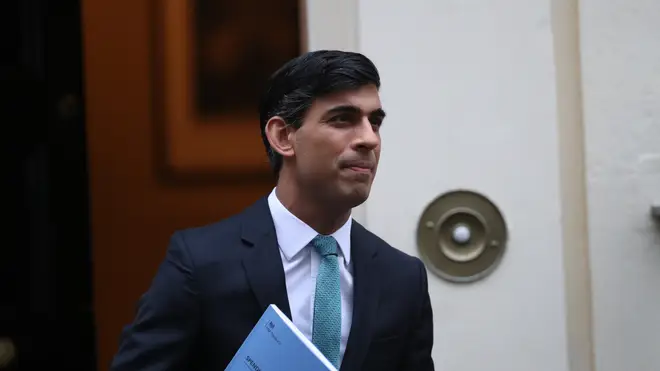
Natasha Devon 6pm - 9pm
14 April 2021, 16:52

Former Prime Minister David Cameron has found himself at the centre of a major lobbying row after attempting to secure financial support for a company using taxpayer money.
Having warned in 2010 that the business of seeking to influence government was "the next big scandal waiting to happen", critics have been quick to highlight the former PM's alleged attempts to lobbying the Government on behalf of financial services firm Greensill Capital.
Ministers and senior officials have been dragged into the row over the company's links with the Government and Mr Cameron's influence over public funds for the now collapsed firm.
But what is lobbying, what are the rules, and why does it cause such unease?

It is the attempt by individuals, charities, organisations, pressure groups and businesses to influence government policy, something which is legal but heavily scrutinised in the UK.
This can happen in many ways, from writing to MPs to taking ministers out for dinner and bending their ear about a subject close to your heart - or wallet.
Lobbying can be used to ensure that an organisation's expert knowledge of a subject - or its concerns - is taken into consideration by MPs and ministers as they make decisions about laws or policies.
But it gets into murkier waters when organisations are lobbying explicitly to secure a financial advantage, something which is alleged to have happened in the case of David Cameron and Greensill Capital.
Campaigners and opposition politicians say the law needs to get tighter on lobbyists, wh
READ MORE: MPs vote against creating new committee to investigate government lobbying

Rachel Reeves condemns David Cameron's 'sleazy' Greensill lobbying
The Transparency of Lobbying, Non-Party Campaigning and Trade Union Administration Act 2014 makes it an offence for someone who is not a registered lobbyist to directly lobby ministers or senior civil servants.
The legislation, passed by Mr Cameron's government in 2014, introduced the Registrar of Consultant Lobbyists, which intends to enhance the transparency of those seeking to lobby ministers on behalf of a third party.
But people lobbying on behalf of their own organisation are not required to register, which is why the former PM was cleared of breaking lobbying rules by the watchdog last month.
Yes - the code of conduct for MPs and peers sets out the standards of behaviour expected, including rules concerning additional income, gifts and personal interests that must be declared and published.
Separately, the ministerial code requires ministers to disclose their interests in detail, while the Government publishes information on ministers' and special advisers' meetings with external organisations on a quarterly basis.
WATCH: James O'Brien hears 'astonishing' insight into David Cameron lobbying controversy

The former PM approached a number of government ministers on behalf the financial firm he started working for in 2018, as well as its owner Lex Greensill.
He tried to secure Greensill Capital access to a loan scheme called the Covid Corporate Financing Facility (CCFF).
Mr Cameron wanted the company to be able to issue loans using tax-payer cash through this scheme and reports suggest he stood to make millions through his shares in the firm as a result.
He sent multiple text messages to the personal phone of the Chancellor Rishi Sunak and approached two junior treasury ministers about the issue.
He also sent an email to a senior Downing Street adviser stating it "seems nuts" to not provide support for Greensill, according to a report in the Sunday Times.
READ MORE: Starmer accuses Johnson of 'blocking proper inquiry' into Greensill lobbying scandal

Labour wants to create an "anti-sleaze" committee to investigate lobbying, including the former prime minister's activities, which would be able to summon witnesses to answer questions in public.
If MPs approve the motion on Wednesday, the cross-party committee would investigate whether current laws are sufficient to prevent "inappropriate lobbying" of ministers and officials.
Senior Opposition figure Rachel Reeves, shadow chancellor of the Duchy of Lancaster, said: "This is much wider than just about what David Cameron has done - this is about what is happening at the heart of Government today.
"This really matters, we need answers, and MPs have a chance to vote for a proper inquiry today."
READ MORE: 'Sleazy' David Cameron acted just 'to line his pockets', says MP Rachel Reeves

Sir Keir confronts PM over Greensill scandal
The Advisory Committee on Business Appointments (Acoba) gives advice to ministers and senior officials on avoiding conflicts of interest and whether new jobs comply with the "business appointment rules".
Former ministers and senior civil servants are expected to seek advice from Acoba about any new roles taken within two years of leaving office. However, the committee has no means to enforce the rules.
This has lead to the committee being branded "totally toothless", while its role has come under scrutiny in recent days after it emerged a senior civil servant took a role at Greensill Capital while still working in Whitehall.